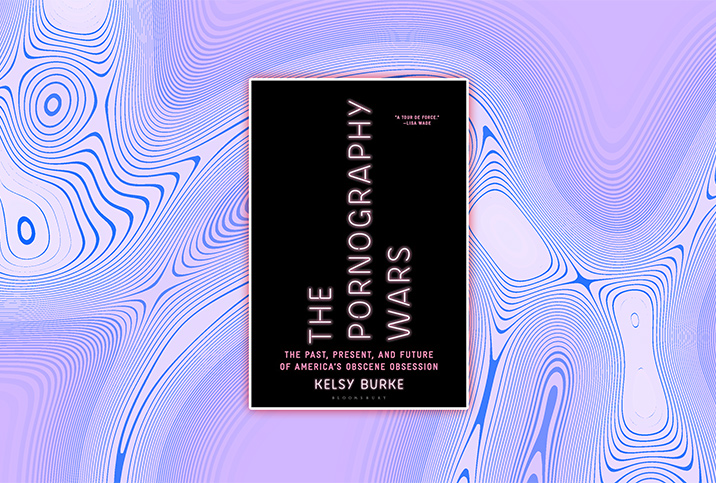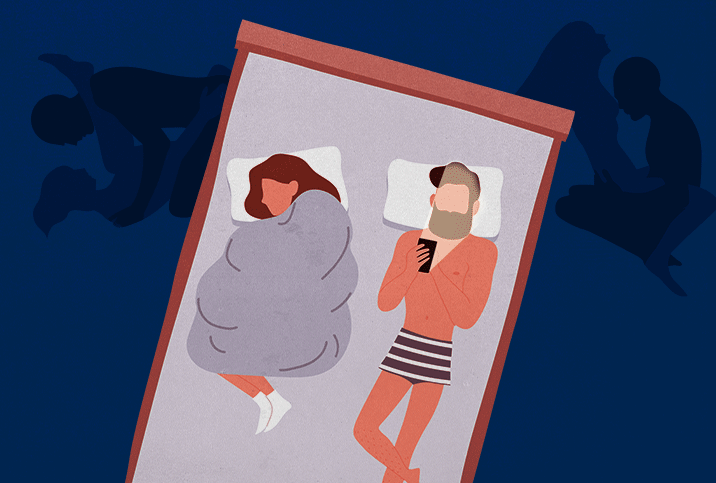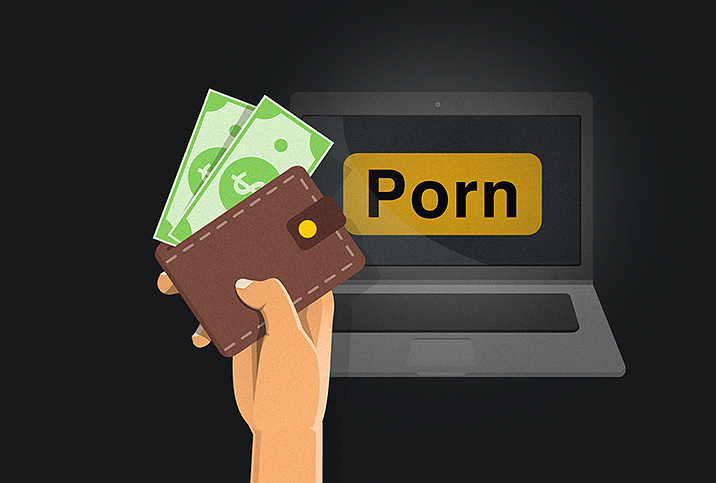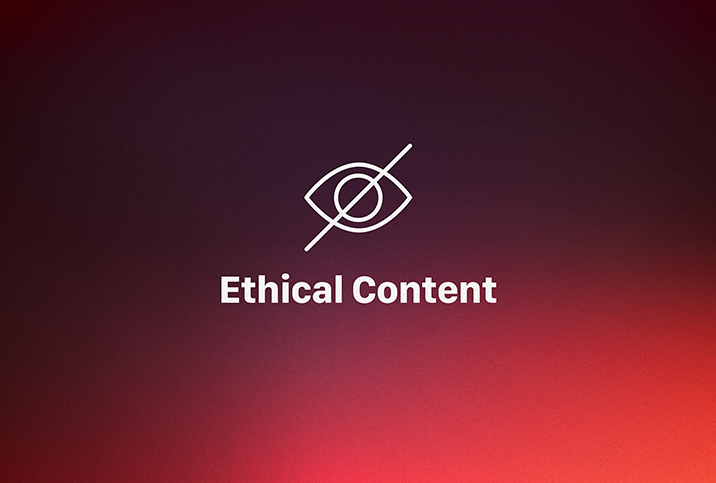Between the Pages: 'The Pornography Wars' Adds Historical Context

Sociologist Kelsy Burke, Ph.D., spent five years researching and interviewing both opponents and supporters of pornography. The result is her engrossing new book, "The Pornography Wars: The Past, Present, and Future of America's Obscene Obsession."
Burke delves into the history of pornography in the United States and provides a thorough examination of the key participants in the discussions regarding the role of porn in society. She also conducted 90 in-depth interviews with activists, sex workers, therapists, religious leaders, porn users and more.
In this exclusive Giddy interview, Burke discusses why she wrote this timely book, what everyone should know about porn addiction, the need for future research on porn and more.
Editor's note: This interview has been edited for length and clarity.
Tell us about your interest in studying sexuality-related topics as a sociologist and how your scholarship led you to write this book.
I was a born-again Christian teenager at a time when I was also becoming increasingly aware I was not growing up to be the straight woman I was supposed to be according to my church. Eventually, I ended up leaving the Baptist college I was attending. I came out as a queer person.
But the joke I like to tell is that I grew up in a super small town in Wyoming, so therapy wasn't exactly on my radar as something somebody could do. So I say that I decided to go to grad school instead to become a sociologist. I studied sexuality and religion to work through some of my own experiences with the conflict between those two things.
I tried to research other things for a couple of years, but I just kept coming back to mostly conservative evangelical Christians and this community that was important to me as a teenager. I ultimately left, but I was so curious about their messaging around sex and sexuality. So it was actually in that context I started hearing a lot about pornography, and specifically pornography addiction.
This surprised me because it was coming from conservative Christians. I thought the line would be more about how pornography is wrong or sinful. But they weren't focusing on that, they were instead using this really medicalized scientific language to talk about how pornography addiction was biological and how it was affecting the brain.
As a sociologist, I just thought, "Oh, that is so fascinating. I want to know what's going on here." So that's what ultimately led up to this big book, "The Pornography Wars."
Is there a definition of pornography?
There's the famous Supreme Court Justice Potter Stewart quote, who said, "I know it when I see it."
That's actually a pretty good definition. Because as a sociologist, I think about pornography as something that can never be disentangled from the social messages that surround it. So it does require a kind of community consensus.
I draw from the work of historians who have argued that pornography actually has a pre-history, a time when it doesn't exist.
People—for as long as humans have been around—have been creating art and artifacts that are sexual or that depict sex and sexuality. These historians say we can't count that as porn in the same way that we think about porn because it didn't have the same kind of social conflict and meaning we attach to porn today.
What distinguishes porn from obscenity in the legal sense?
The courts for a very long time have had to figure out, when it comes to sexual material, what is legal and protected under our right to free speech, and what is not legal and falls under this category of obscene, which has never been protected by the Constitution.
The problem is the courts have been pretty lousy at coming up with really clear and consistent definitions that draw the boundaries between what's an obscenity and what's not.
There were a series of Supreme Court cases between the 1950s and early 1970s in which the court was trying to work this all out. The Supreme Court case most often cited was decided in 1973, Miller v. California. That established what's now called the Miller Test. It sets out guidelines for what counts as obscenity.
But even that is not so clear-cut.
These guidelines include that you have to figure out if an average person would find the material offensive, and that the work doesn't have any literary, artistic, political or scientific value.
So these are all pretty subjective measures. But they're the guidelines the court uses to make the distinction.
Who are the main camps in the current pornography wars?
On the anti-porn side, the movement has often been described as a strange bedfellow alliance between different kinds of social actors. I think it's more rhetorical than what's actually happening on the ground, especially in the 21st century. Certainly, there are conservative Christians who have mobilized for a long time to say pornography is harmful, and it's bad for society, families and women.
Another group comprises anti-porn feminists who were really mobilized in the 1970s and 1980s. Today, there's less of an organized movement, but there are certainly still feminist arguments made about how pornography damages women.
More recently, there's been this argument that pornography is physically addictive and it's especially bad for men who watch it.
With the advent of the internet, in particular, the idea or the concept of porn addiction has become popularized. There are these online communities of secular millennial men who see porn as being a problem for their sex lives and their real-world relationships. They want to quit using porn for that reason.
I don't refer to "the other side" as the pro-porn movement because the people I talked to who worked within the porn industry and advocated alongside it were not uniformly positive when it came to commercial porn. Many were actually quite critical of the company I write about in the book, MindGeek, a big corporation that owns virtually all of the porn websites.
The "porn-positive movement" is [the phrase] I use instead. That's a diverse group of people, which includes porn performers and sex workers within the industry, sex educators who want to confront pornography in a more nuanced way, clinicians, activists and so on.
Is porn addiction real?
As a sociologist, I think I answer this question differently than a lot of other scientists do. In my work, I see that porn addiction is real in the sense many people, mostly men, say it's real and say it affects their lives.
I'm interested in what pornography addiction comes to represent in those people's lives and then also within a broader society.
It's not a classified mental disorder in the DSM-5 [Diagnostic and Statistical Manual of Mental Disorders, Fifth Edition]. Interestingly, though, the ICD-11 [International Classification of Diseases, 11th Edition], which is the international classification the World Health Organization [WHO] uses, does list compulsive sexual behavior as an impulse disorder. But that's different from their section on disorders due to substance use and addictive behavior.
What's interesting about that is both sides called it a win when the ICD-11 added that. The porn addiction proponents have said, "See, it's only a matter of time. We're getting closer to recognizing that we need to diagnose and classify pornography addiction." And the people who are critical of porn addiction say, "See, this is evidence that it's a different beast. It's not an addictive behavior, we need to understand it as something else."
People within the porn addiction recovery movement love to talk about science and that science is on their side. I think the science is still out. We can't say conclusively whether or not porn is addictive, like other behavioral addictions.
I'm also really interested in how porn addiction rhetoric gets entangled with conservative evangelical efforts that are much broader than helping people with a porn addiction recovery journey. They really oppose all forms of sex work and all forms of pornography and have a particular political agenda that is bigger than the 12-step program of helping individuals overcome addictions.
What areas need further research?
I think more work is needed to consult and invite the voices and feedback of sex workers themselves, and people within the industry. And I'm not just talking about science, but also policy and politics.
So often, I think social scientific research on the effects of watching porn, for example, has this negativity bias where the questions are more about how porn is bad for you. We never asked the question about how might porn be healthy in your life.
We need research that asks some different kinds of questions about porn, and we just need more data. I think we just need more data on people's habits because we just don't have a lot of good data right now.


















